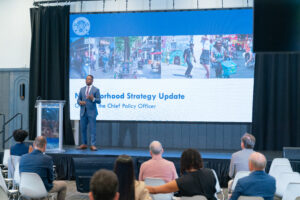At Westside Future Fund’s June Summit at The Gathering Spot, attendees explored how strategic investments in neighborhoods can shape Atlanta’s future. In a city where life expectancy can differ by 20 years across just a few miles, the conversation focused on the urgent need for systems-level change.
The summit’s featured speaker, Courtney English, Chief Policy Officer and Senior Advisor in the Office of Atlanta Mayor Andre Dickens, outlined Mayor Dickens’ vision for a better Atlanta through a powerful and deeply personal reflection on the connection between policy, place, and opportunity.
The monthly event, hosted by Westside Future Fund President & CEO John Ahmann and community advocate Ebony Ford, began with updates from Home on the Westside. Ahmann highlighted the newly available homes in Vine City and English Avenue, sharing WFF’s plan to bring more than 20 additional homes online by the end of the year. Through the program, eligible buyers can access an average of $50,000 in down payment assistance, making homeownership more accessible for Westside families and legacy residents.
Michele Ogden, Internship Engagement Coordinator, Office of Career Planning and Development, Spelman College, delivered the morning devotion.
Key Highlights from the Discussion
Mayor Andre Dickens aspires to shape Atlanta into one of the best cities in the country to raise a child. His vision, English outlines, revolves around transforming distressed neighborhoods into thriving ones where every child — regardless of ZIP code — can grow up safe, healthy, and with real economic opportunity.
English, a lifelong Atlantan and graduate of the Atlanta Public School system, spoke candidly about the legacy of intentional disinvestment in historically Black neighborhoods — and the city’s responsibility to reverse it.
“This did not happen by accident,” he said. “It happened through years of malicious policy decisions that were designed to segregate the city. They were designed to segregate folks based on race and class.”
He pointed to alarming disparities in life expectancy between ZIP codes — residents in Buckhead’s 30305 live, on average, 20 years longer than those in Westside’s 30318. These disparities extend across access to healthcare, educational outcomes, broadband, housing, and public safety.
“This system is not broken. In fact, the system is working exactly as it was intended to work. And without intervention, it will keep functioning. It no longer requires active participation — it simply requires our silence or our inaction.”
English emphasized that Atlanta’s transformation must be rooted in a comprehensive, place-based strategy — one informed by residents and focused on the neighborhood’s health. Healthy communities are characterized by access to high-quality education, mixed-income housing, economic development, available green space, etc.
When low-income students live in healthy neighborhoods, English noted, academic performance rises. And when public, private, and nonprofit sectors align around resident-informed solutions, real change becomes possible.
Moving Forward Together
Westside Future Fund is proud to stand alongside community leaders, residents, and city partners like the Office of Mayor Dickens in building a thriving historic Westside community. By investing in people and place, we’re not just improving neighborhoods, we’re making Atlanta the best place in the country to raise a child.
As English reminded us, “we don’t have to guess about where inequality leads — we’re staring it in the face. The question before us is, who will we choose to be?”
Miss the event? Watch the full June Transform Westside Summit on our YouTube channel.

